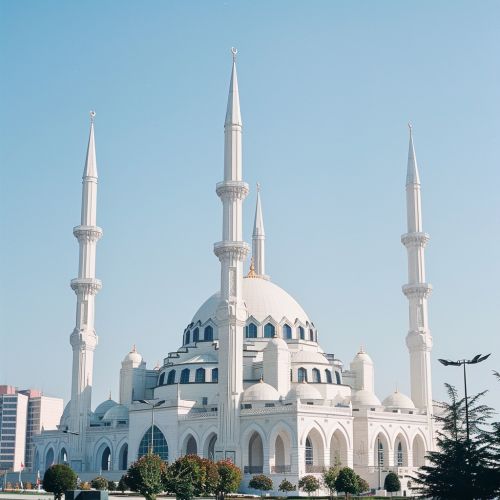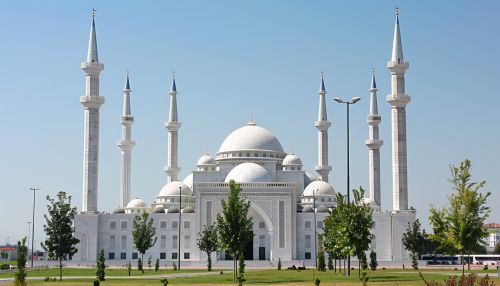Faisal Mosque
Architecture
The Faisal Mosque is a unique blend of ultramodern and traditional architectural design styles. Designed by the Turkish architect Vedat Dalokay, the mosque's design is a departure from the long history of dome-and-minaret architecture that is often associated with mosques around the world. The mosque's architecture is a fusion of contemporary design and old Islamic tradition, which is a reflection of Pakistan's emergence as a modern Islamic state.


The mosque is shaped like a desert Bedouin's tent and functions as the national mosque of Pakistan. The mosque's design features eight-sided shell shaped sloping roofs forming a triangular worship hall which can hold 10,000 worshippers. This main hall is a large triangular prayer hall with a 40 meter high roof, covered in white marble. The mosque's architecture also features four unusual minarets, each 80 meters high, the tallest in South Asia at the time they were built.
Location and Surroundings
The Faisal Mosque is located in the national capital city of Islamabad, Pakistan. The mosque is situated at the north end of Faisal Avenue, in the foothills of Margalla Hills, the westernmost foothills of the Himalayas. This location is significant as it makes the mosque a visible landmark throughout the capital city.
The mosque is named after the late King Faisal bin Abdul-Aziz of Saudi Arabia, who funded and supported the construction project. The mosque's location is a reflection of the historical and cultural ties between Saudi Arabia and Pakistan.
History and Construction
The construction of the Faisal Mosque began in 1976 after a $120 million grant from King Faisal of Saudi Arabia. The mosque was completed in 1986 and is the largest mosque in Pakistan, covering an area of 5,000 square meters. It can accommodate 300,000 worshippers, including those in the adjacent grounds.
The mosque was designed by Turkish architect Vedat Dalokay, who won an international competition for the design. Dalokay's design was chosen for its bold and unconventional concept, which combined traditional Islamic architecture with modern design principles.
Significance and Role
The Faisal Mosque holds immense significance in Pakistan. It is a symbol of the country's rich Islamic heritage and its commitment to the principles of Islam. The mosque is not only a place of worship but also a major tourist attraction in Pakistan. It is also an important center for Islamic learning, with the International Islamic University located in the mosque complex.
The mosque's unique design and large capacity make it a significant venue for Friday prayers and Eid prayers. The mosque is also used for Quranic recitations, religious lectures, and Islamic conferences.
